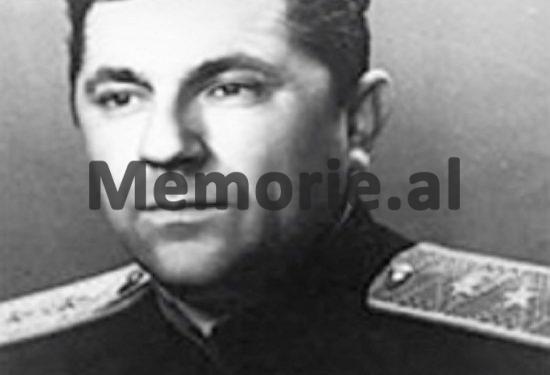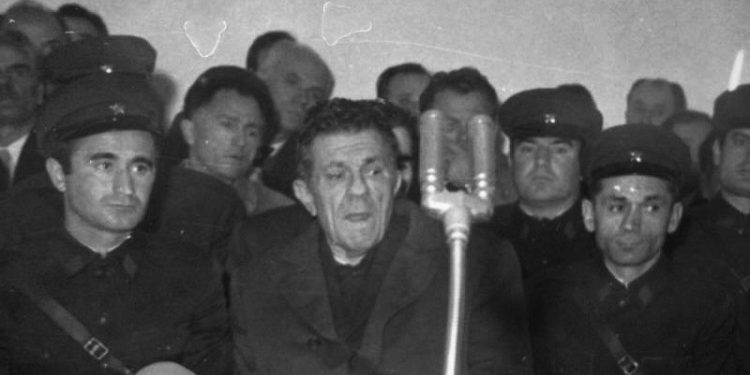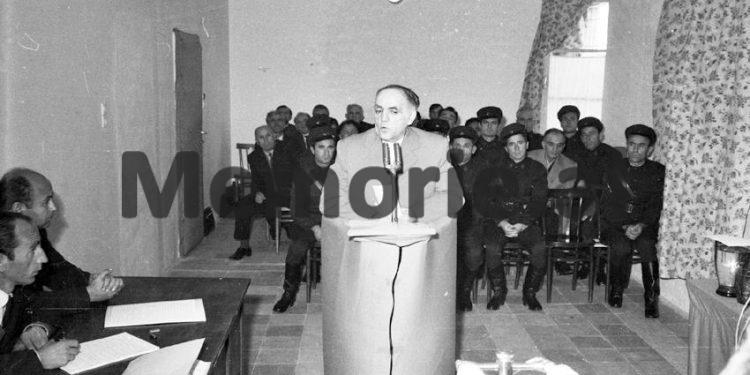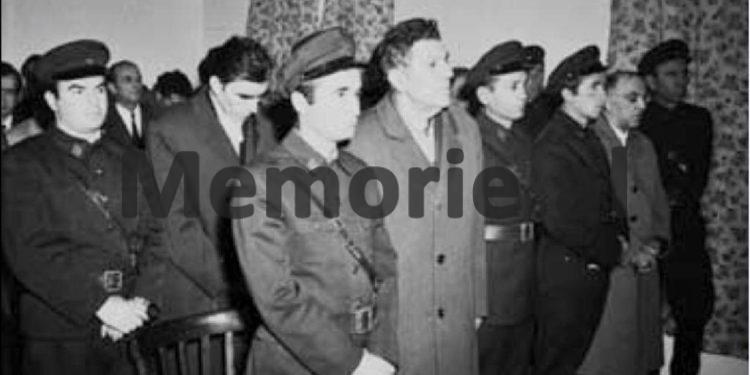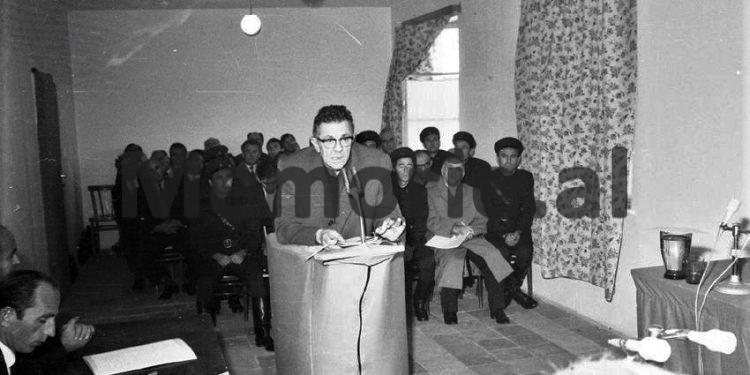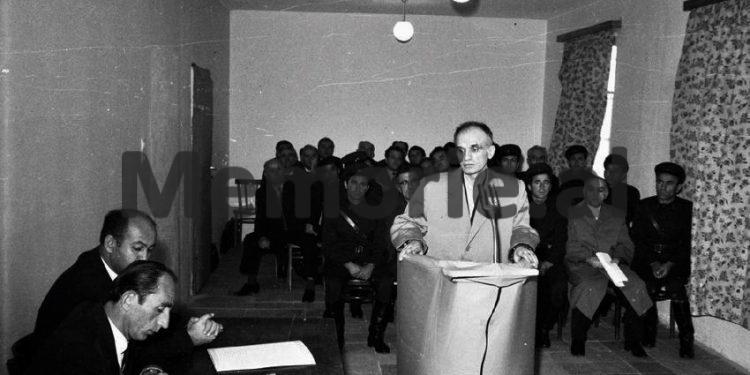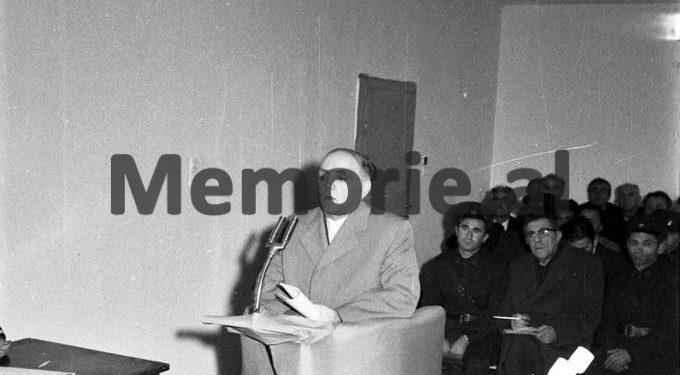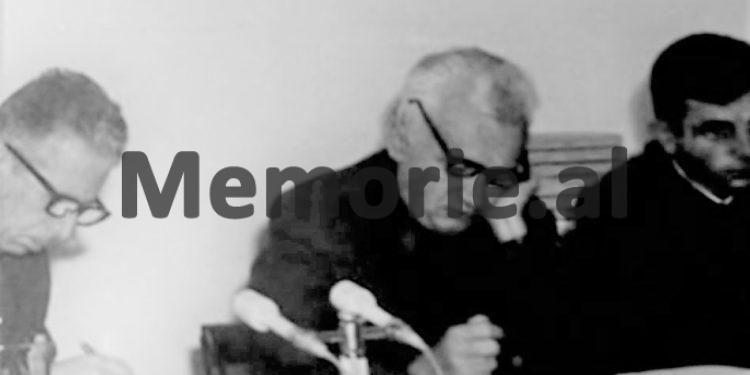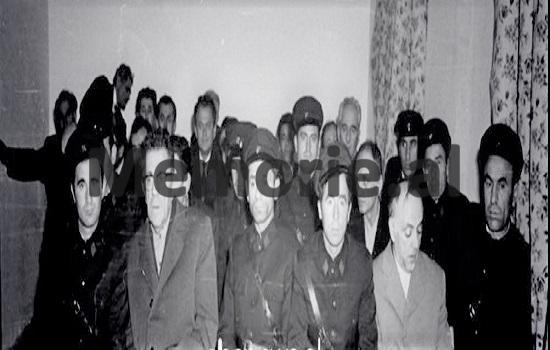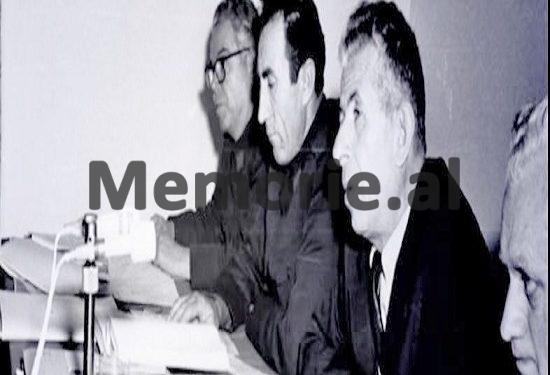By Afrim Imaj
Memorie.al / He were performing military service, when he was asked for another service. The unexpected order came from the higher authorities. The soldier from Lezha could not say “No”. The military oath presupposed unconditional implementation. What’s more, the obligation as a member of the party? Chosen for the moral integrity of the family, for exemplary behavior and high results in the ward, Lirim Gjeta, became part of the jury in the trial of Beqir Balluku and other generals, crucified for “high treason and hostile activity”. He was only 20 years old when he was entrusted with this task, the importance of which surpassed the seriousness of his age. However, Zall-Herri’s soldier tried to compensate for this disadvantage, with the weapon of silence and routine presence in the marathon sessions, in front of the defendants, the former top leaders of the Ministry of People’s Defense and the Albanian Army.
How is the drama of those days fixed in his memory, who were the “directors” of the monstrous confrontation, what were the reactions of the generals before the fatal moments, what did he think about the way the sensational process of the generals, so-called, has unfolded so far “putschists”, etc. In an interview for us, Lirim Gjeta, recounted for the first time, the impressions from the trial of Beqir Balluku, Petri Dumes, Hito Çakos and Rrahman Perllaku, disclosing part of the mysteries from the position of an eyewitness, called there to complete the official “decor” of the judging panel…!
Mr. Lirim! In the file of the judicial process of Beqir Balluku, Petri Dumes and Hito Çakos, it appears that you were a member of the jury. Under what conditions are you called to be the judge of the generals?
I don’t know who initiated my name, to be part of that sensational process. I was young, very young then. I had just turned 20 years old. Everything was unexpected. A call from above and everything then went as predicted. Even today, after almost 30 years, I am not clear about the circumstances in which I was chosen to do this duty. Those were other times and things worked completely differently…!
Undoubtedly, every one of the judges at that time would obey the order to become part of such a process…! However, in my case, it is something quite special. I became part of that judicial process, without having any connection with the justice bodies. If I were a lawyer, judge or investigator, it would be normal, regardless of the names of the defendants and the content of the legislation in force. Meanwhile, I had no connection with the bodies of the Security and Secret Police, which became catalysts of attacks of this nature…!
Why didn’t you graduate in law at that time?
Not only had I not graduated, but I didn’t even think of studying in this field. At that time, Law was mainly reserved for the children of high officials and their friends. I, after high results in high school, with difficulty won a scholarship to the two-year Institute of Shkodra, for the Teacher. Start after graduation then…!
A teacher was thus called to be the judge of Beqir Balluk and other army generals…?!
The truth is that, at that time, I was not working as a teacher. After graduating in Shkodër, according to the rules, I was called to perform the mandatory military service at the School of Instruction in Zall-Herr. Right there, I was ordered to become a part of Beqir Balluk’s jury. It was something unexpected and came to me like a bolt from the blue. To tell you the truth, I never found out the circumstances of how I was entrusted with this delicate task…!
So you were a soldier, even a simple soldier when you were entrusted with the duty of judge for the generals. Doesn’t something like that seem paradoxical to you?
After all, it was a military order which meant that it had to be obeyed. At least, that’s how they presented it to me. So, there was no question of opposing it, as long as its content did not conflict with the Constitution of the time. This, for a soldier, was the ABC of duty and mission. Then things must be evaluated in the context of time…!
Do you remember how they communicated the order to participate in the judging panel of Beqir Balluk…?!
I had been doing military service in Zall-Herr for several months. In the unit, I was one of the few soldiers with a high school education and a party tessa in my pocket. This, so to speak, gave me a somewhat special status, compared to others, but I never took it for a privilege. I performed all training and service duties responsibly. Yes, I was among the distinguished soldiers in the ward.
I remember that, precisely for this reason, two of the department’s instructors, Zeno Jahaj and Tafan Tafani, treated me like their colleagues, officers. In this course, one beautiful day, quite suddenly, I was called to the school command and told to appear at the Ministry of Defense, to meet with the deputy minister, Nazar Berberi. The next day, they communicated the order to me, to become part of Beqir Balluk’s process…!
Who communicated this order to them?
The order was communicated to me by Nazar Berberi, in his office at the Ministry of Defense. I went there at the appointed time. At the checkpoint, I was met by the guard officer, who apparently had been instructed in advance how to act. He provided me with an entry form and accompanied me to the deputy minister’s office. To tell the truth, for the first time, I entered that building and the beautiful view of the corridors and its surroundings put me in a kind of anxiety. Nazar Berberi, who understood my situation, received me kindly.
After asking me about my health, family and the situation in the ward, he told me that the party entrusted me with an important task. I am a party soldier, I told him on the spot. So Mr. Berberi, in a calm and solemn tone, began to tell about the content and importance of the task entrusted to me: “You are a communist and I believe that you are aware of the hostile group that the Party and Comrade Enver have discovered in the Army. Now the coup plotters are in the dock and will appear in court. It has been decided that, in the group designated for their punishment, you will also participate…”! That was his entire lecture.
At the moment, I was unable to understand what my position would be in the group that was assigned to punish the coup plotters. I didn’t even have any idea about its nature. Right then and there, I thought of some group of people who would deal with denouncing the hostile activity of the Army leaders who had been arrested before. As for participating in the judging panel, I never even thought about it. How could it occur to me that I, a simple soldier, would be the judge of these generals, who were accused of treason…!
So, in the meeting with Nazar Berber, did you remember that you would be part of the group that the leadership of the ministry had set up to denounce the hostile activity of the generals…?!
To be honest, that’s how I valued those moments. Being a member of the Party, I thought that I had been chosen from the ranks of the soldiers, to clarify the people, about the hostile activity of the generals. At that time, the organization of various groups was widely practiced, to clarify the opinion, about the problems raised by the Party. In this particular case, the task had a different purpose. I was selected to be part of the judging panel of Beqir Balluk and other generals. I found this out later…!
Rare evidence from the coup plotters’ trial
“Not everything has been revealed as it actually happened”. With this conviction, one of the members of the jury, who condemned the group of generals in ’75, shows his reservations about the way the sensational process has been revealed so far. With great difficulty, the 20-year-old ex-judge, Lirim Gjeta, overcomes the tempting hesitation and begins to tell about the torturous sessions in the confrontation with the adults who went to the guillotine. His confession is the first testimony, which comes after almost five decades, from the courtroom of the so-called putschists.
Of course, he cannot remember the course of judicial developments in detail, but the former judge has fixed their “core” in his memory. This was for him, one of the most terrible events with nightmares and mysteries that have accompanied him throughout his life. What’s more, when his duty required, he kept to himself, everything he had seen and heard in that ominous hall. For him, he didn’t have to talk to anyone, not even his parents and brothers. This made Lirim Gjetaj doubly tempting. A temptation that accompanied him for years and decades. However, his testimony is as interesting as it is dramatic.
Drilon ’71, the days when the idea of a military coup was conceived!
Enver Hoxha was vacationing in Drilon, when the idea of a terrible coup struck him. It was the hot summer of ’71. Earlier, in the winter frost of that year, the Party had gathered an important assembly. The so-called 12th Plenum of the Central Committee was identified with the challenge of bunkering and the drafting of People’s Military Art. Their fulfillment presupposed a guarantee from any external aggression. Attentive to the flow of situations, Enver Hoxha, who believed the challenger in the face of multiple encirclement, did not forget the internal danger. What’s more, this nightmare haunted him when he left Tirana.
Where he was, he was remembered for occasional blows. From Driloni, this time his mind went to Beqir Balluku. One phone call was enough and in just a few hours, the head of the Ministry of Defense would listen closely to the Commander’s concerns. His orders for the reformation of the Army in the conditions of the People’s War, for coping with a coalition of enemies and for building a new strategy, in accordance with the developments of the time, remained the top priority for Beqir Balluk. Immediately, he assured Enver Hoxha and rushed to the Corps of subordinates to give them his orders.
Reflecting on them required the review of defense documents, military regulations, the Art of People’s War, etc. The reaction was immediate. With action plans, action programs, working groups, engagement of experts, etc. The military leadership already had the big test before it, in other words: “trial by fire”, according to its jargon. For weeks and months, he worked with extraordinary zeal to give life to the “defense theses”, as Enveri had ordered. Yes, things would not go well.
The crystallized “product” would, step by step, undergo a fatal metamorphosis. The unexpected happened two years later, when the “Commander” seemed to have forgotten Drilon’s orders. His courtiers, one fine day, would give the chilling alarm: “What happened to Comrade Enver’s orders”? “Who sabotaged the defense theses”?! “Why were their demands alienated”? “Who is hiding behind the defeatist strategy”?!
Now, another story was taking place. The odyssey of the famous “Theses” was heading for a murderous epilogue. The drama that followed took their name. “Defense theses” were already called by other names, “black theses”, “coup theses”, “conspirators’ theses”, etc. A monstrous storm would precede the terrible crusade. In its trap, one by one their protagonists would fall. The suite of seven majors has already faced chilling accusations. Party meetings, plenums, arrests, investigations and finally the trial.
The trial, which ordered the shooting of Beqir Balluk and other generals…!
“Beqiri sabotaged the military regulations”! “It is true that there have been problems with military regulations, but in no case, intentional, at least on my part, as Minister of Defense.”
Crucified in the face of accusations of treason and hostile activity, Beqir Balluku is forced to affirm that he was wrong, but in no case, he does not accept the role of the opposition to the Labor Party.
Most notably, this attitude appeared during the confrontation over the question of sabotaging military regulations. From the beginning to the end, the former Minister of Defense tried to defend himself, with the idea of unconscious actions, focusing on moral and political responsibilities. During the dialogues with the judicial body, he insists on being exempted from criminal responsibility, regardless of the consequences brought about by his activity in the field of defense. How did the confrontation between them continue…!
JUDGE: Defendant Beqir Balluku. Provide clarification regarding sabotage in the field of military regulations. How have the orders of the Central Committee and the Defense Council been implemented, so that the regulations of the Army respond to the requirements of the Party’s policy, the Theses of the Defense Council?
BEQIR BALLUKU: Regarding the regulations. In 1963, we issued instructions, some measures were taken to introduce certain forms into the army, to avoid all those foreign experiences and methods, which were identical, translated regulations from the Soviet Army. In this direction, some work was done, related to some new concepts or methods that could be introduced into the field of our operational tactical art, some reports were made, some ideas were thrown. These also required correction of regulations. In this direction, some work has been done, but this work has not gone in the right direction.
The regulations have not been connected to our reality; the attempts to adapt the regulations have suffered a lot. They are not related to the forms of learning, or acquisition in the field of our operational art tactics, etc., but regulations have begun to be formulated and these regulations are always influenced by old regulations. I.e., that were inherited not only in the world and the concepts of people who dealt with these, but extracts were taken from these regulations, inserted or made into patches, patches sewn with white cloth…!
JUDGE: After the Defense Council Theses came out, what happened to the military regulations?
BEQIR BALLUKU: Attempts were made to make regulations, but they were afraid, as I said, even after 1963 and especially, after the publication of the Theses, every directorate was tasked with drafting regulations.
JUDGE: Who abolished the garrison’s discipline regulations?
BEQIR BALLUKU: In 1966, when the Open Letter came out, I removed the disciplinary regulation; it was removed by my order.
JUDGE: Did you inform the Central Committee and the Defense Council about this important measure in the life of the Army?!
BEQIR BALLUKU: I have not made it known, but in the conversations I have had, I have said that the regulations related to these revolutionary measures, with this style and method, or even with these forms required by the Theses of the Defense Council, the regulations, definitely were in flagrant opposition, with all the norms, with all the requirements, be it in the way of discipline, internal order, etc…!
JUDGE: Why didn’t you work out the new regulations and then remove the old ones. You wouldn’t make regulations, would you work without regulations?
BEQIR BALLUKU: By removing these regulations, now the Army would operate without regulations, i.e., everything will be done by measure, the line of measure. An army, such as the army of the People’s Republic of Albania, cannot be regulated in a useless way, without regulations.
JUDGE: Why didn’t you work out the new regulations and remove the old ones?
BEQIR BALLUKU: I was wrong here and it is liberalism on my part and I fully accepted it. The disciplinary regulation, the chapter that talked about measures, punishments, prison, etc., could be adjusted, while in the “Open Letter”, it was decided with political conviction, there were several other norms. I was not for the regulations not to be replaced, but I was for them to be removed and done as soon as possible.
JUDGE: Before removing these, did you take measures to make new regulations?
BEQIR BALLUKU: At that time, nothing was done about this work.
JUDGE: What were the consequences of removing the regulations?
BEQIR BALLUKU: This has spread in-discipline, but with the intervention of the leadership, these were fixed. Not many months passed and they were replaced, with the discipline regulation.
JUDGE: What consequences did it have, anarchy was created, people were perverted, and liberalism was created?
BEQIR BALLUKU: This paved the way for liberalism. Memorie.al
The next issue follows




